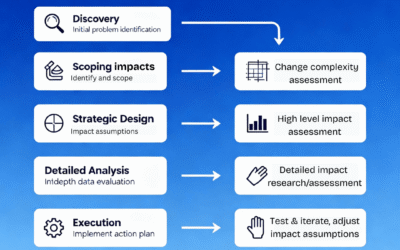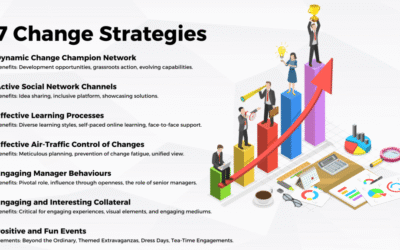Most change practitioners fall into the trap of thinking that change impact work begins and ends with the change impact assessment – that single exercise conducted before the midway of a project to determine who's affected and how. This narrow view fundamentally...
Latest Blogs •
Designing quality change experiences
Successfully achieving business outcomes through change requires good people change experiences. A positive employee change experience means that he/she is more likely to be engaged and more able to deliver a great customer experience. This focus on people-centred...
Data-Driven Strategies to Boost Employee Readiness During Change
The topic of change is often inundated with literature stressing that it is about people, feeling, attitudes and behaviour. While these are important, lot of articles centred about the human-nature of change often ignore the importance of data during the change...
How to use gamification for change: Your guide
Gamification is the application of game mechanics and elements to non-game activities, greatly enhancing the player experience. Whilst gamification has been around for a long time, it is only recently that it has been formalised as a structured method to achieve...
Successful Change Journeys: 7 Outstanding Ways to Transform
Right now I am writing this article from a Four Seasons resort in Hawaii after having 3 flights cancelled in a row. It has been quite a stressful experience as you can imagine and it’s the fourth day of delay. I’m not able to get back home! However, this started to...
Why We Are Change Resistant: Insights and Solutions
Change is an inevitable part of, not just corporate life and business processes, but life in general. It’s a natural occurrence that we all must face at some point. But despite the many benefits that organizational change can bring, many of us are still reluctant to...
The Enterprise Change Champion Model: How to Build Change Capability and Talent – Simultaneously
Rethinking Change Champions Beyond the Project Lens For decades, the change champion has been a familiar figure in large-scale transformation projects – the trusted liaison between the change team and the business, responsible for rallying colleagues,...
Boost Success with Organizational Change Management Software
It used to be that change management is the ‘poor’, neglected cousin of other disciplines in terms of access to functional software to assist in its performance across every aspect of change and risk management. There is a wide range of software available for a range...
Change Readiness Assessment: A Strategic Approach
Change readiness is one of the most critical, yet often misunderstood, concepts in organizational change management. For many practitioners, it’s been reduced to a series of surveys or assessments — a simple gauge of how “ready” stakeholders feel. But this...
How to Manage Change Saturation using this ancient discipline
Managing change saturation and change fatigue can be tricky, but a common occurrence and a status quo for large companies when various types of changes occur in unison. External factors mean that the volume of change is often necessary. It is not...
supply chain gamification infographic
Gamification for Change Management: Transforming Engagement and OutcomesChange is a constant in today’s organizations, but ensuring that employees embrace and sustain new ways of working remains a persistent challenge. Traditional change management methods—relying on...
Leveraging Emotions to Drive Meaningful Organizational Change
Change and transformation initiatives rarely fail for lack of strategy or technical expertise - they falter when leaders underestimate the emotional dimension of change. For seasoned professionals driving organization-wide transformation,...











